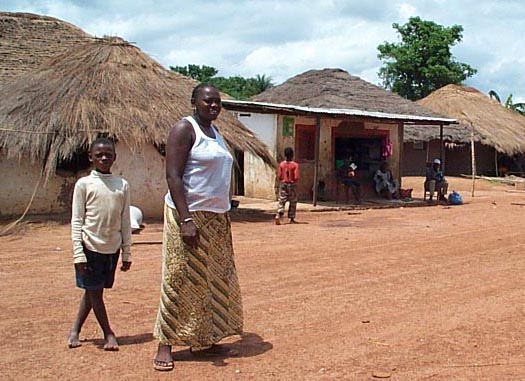
Peace Corps Volunteers worked as Primary School Health Teacher Trainers in Central African Republic
Peace Corps Volunteers worked as Primary School Health Teacher Trainers in Central African Republic
Primary School Health Teacher Trainer: Central African Republic
The government of the Central African Republic is committed to making its education system more relevant to the needs of its people. When over 80% of school-age children did not go beyond the primary school level, the government felt it imperative that their six years of education provide them with the skills and knowledge to improve their lives, to build a collective spirit, and to demonstrate that on e can live a rewarding life in a rural, agrarian setting. Unfortunately, the gap between the intention and its realization is wide and complicated by the inertia of the status quo and the teachers' lack of training. The Peace Corps became part of this effort in 1977, and on-going projects have concentrated on health and its relation to all facets of community life.
This health project focused on training and motivating Central African primary school teachers under the supervision of the Regional Superintendent of Schools. One Volunteer assigned to the project met with her teachers on a regular basis to solicit their participation in a school health program and to upgrade their knowledge of health. She gave demonstration classes to her teachers and visited their classrooms to evaluate their performance. During school vacations she helped to organize in-service training sessions drawing upon local resources in the health and education fields.
To prepare for this assignment, the Volunteer, along with others assigned to the same project, spent 12 weeks in intensive training, which encompassed language, technical, and cross-cultural elements. She also spent two weeks at the London Wellcome Museum of Medicine studying tropical diseases. Technical training concentrated on methods of dealing with health problems where resources were limited, and the practical tasks of teaching health education, evaluating teachers, and developing materials. In addition, she spent several weeks in the home of a Central African, during which she gained insight into the culture through observation, discussion, and involvement in family life. Peace Corps training, coupled with her five years experience as an elementary school teacher in the United States, prepared her for an assignment as a health teacher trainer in the Central African Republic.
The Volunteer lived in a small town without electricity or running water. Her housing was simple but adequate. She hired someone to do her cooking and other household chores. After boiling and filtering, well water was safe for drinking and cooking. Kerosene lamps provided her with light at night. The Volunteer worked in the schools in her hometown, as well as those in outlying areas, using a motorcycle to travel to rural schools. Because of the road conditions and distance between towns and cities, she did not have much contact with other Peace Corps volunteers.
Her job was demanding in that she was asked to help with all aspects of the project: curriculum development, teacher training, and organizing school health activities. In her work, she encountered complacency and what seemed like endless delays. Her ideas and suggestions were greeted enthusiastically, but the work they entailed required her constant encouragement. Her efforts to involve the teachers, directors of schools, and superintendents in planning and taking responsibility for achieving results sometimes met with resistance and indifference. On the other hand, she had the opportunity to work and associate with Central Africans on a daily basis, and to become a part of their culture. The Volunteer had to develop realistic expectations of what she would be able to accomplish, and to realize that development is a slow process that does not happen in two-year increments. Future volunteers will build upon her efforts and, in the long-term, the Central African Republic will be aided in its goal of a healthier, more rewarding life for its citizens.
